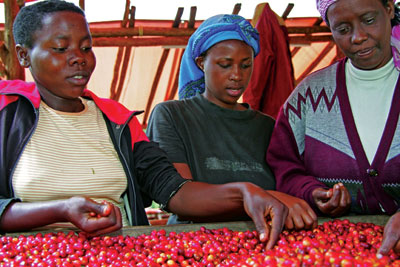Rwanda’s coffee export earnings plummeted to $5.05m (about Rwf3.4b) during the first quarter of this year, down from $11.6m (about Rwf7.8b) in the same period last year, statistics from the National Agricultural Export Board (NAEB) indicate.


Rwanda’s coffee export earnings plummeted to $5.05m (about Rwf3.4b) during the first quarter of this year, down from $11.6m (about Rwf7.8b) in the same period last year, statistics from the National Agricultural Export Board (NAEB) indicate.
This was a 56.5 per cent year-on-year decrease. The export volumes also dropped to 2,201 tonnes during the quarter compared to 3,698.6 tonnes recorded over a similar period last year.
Celestin Gatarayiha, the head of coffee division at NAEB, attributed the drop in value to a decline in international coffee prices compared to the first quarter last year.
He added that January-March is usually off season for the crop, meaning that the country was exporting old stocks over the period.
"When the international prices are low, we export less and store the coffee until the prices improve,” he explained.
The average price per kilogramme of coffee stood at $4.8 (about Rwf3,218) during the first quarter last year, but dropped to $4 (about Rwf2,681) over the first quarter of this year.
Gatarayiha said though they expect better revenues of about $70.4m (about Rwf47.2b) from the crop this year, it was hard to predict when international coffee prices will improve.
Rwanda exported 19,969 tonnes of coffee worth $55.2m (Rwf37.2b) last year, a big decline from $69.5m (Rwf46.8b) revenue earned in 2012.
"We are working with coffee farmers, providing them fertilisers and extension services to boost output. NAEB is also sensitising farmers and dealers to ensure proper post-harvest handling of the crop, which will improve coffee quality...Better coffee quality translates into better revenues,” he said.
Coffee is one of Rwanda’s leading foreign exchange earners after tourism, mining and tea.
The crop also performed poorly last year because of prolonged drought, according to NAEB.
International prices stood at an average $3.67 (Rwf2,494) per kilogramme for fully-washed coffee last year, down from $6 (Rwf4,044) during the 2012 season.
Rwanda’s largest coffee export markets are in Europe, the US and Asia.
NAEB increased the indicative coffee farm-gate price (the minimum price payable to farmers) to Rwf200 from Rwf142 per kilogramme at the beginning of the country’s coffee season in March.
The increase followed a price surge on the international market in January. In January, the monthly average of the International Coffee Organisation composite indicator price was above $3.9 per kilogramme of robasta coffee, the highest rate in four months.
Coffee prices on the global market had plummeted to as low as $2.66 in August last year, as Brazil and other major producers flooded the market, but predictions for the 2014/15 coffee year are also bleak.
Official Brazilian production estimates for crop year 2014/15 that started in April, suggests that output could fall for the second consecutive crop year, giving an initial forecast of between 46.53 and 50.15 million bags.
The International Coffee Organisation said the uncertainty over the 2014/15 crop and dry weather conditions in some coffee producing regions boosted coffee global prices.


